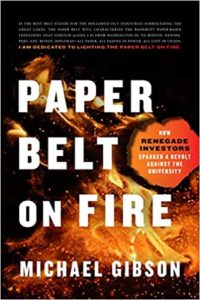
Gibson was hired by Thiel Capital in 2010, primarily to assist Peter Thiel in teaching a course. But immediately Gibson became involved with the Thiel Fellowship, an initiative to pay select young people $100,000 a year for two years to do something other than attend college. A few years later, Gibson and his co-worker, Danielle Strachman, broke away to start a venture capital fund called 1517, that would back very young entrepreneurs, including teenagers.
Screening candidates for the Thiel Fellowship and then searching for young entrepreneurs gave Gibson and Strachman a unique experience finding unusually gifted individuals. Like Tyler Cowen and Daniel Gross in their book Talent, Gibson and Strachman were looking beyond the standard indicators of intelligence to find intangible qualities. Gibson’s chapter “Intelligence Redefined,” is at least the equal of the Cowen-Grossman book.
For Gibson, the key quality is a sort of wily resourcefulness.
The great founders are the ones who always find a way. This is their highest virtue.
What does it take to “find a way” in the world of tech start-ups? Gibson lists five abilities founders need:
Second, the ability to adapt as a company grows from a handful of people in a room to a giant corporation. I myself have noticed that small firms can and should be managed informally, but when you get past the Dunbar number of about 150 employees, you start to need formal mechanisms—organization charts, company manuals, internal training programs, and so the like.
Third, what Gibson calls “hyperfluency.” The founder must have superior knowledge of a technology/market niche but also must be able to communicate that knowledge to ordinary people unfamiliar with the niche.
Fourth,
Finally,
When I started one of the first commercial sites on the Web, I had something to prove. Previously, working in a large organization, my experience had been that when an idea of mine became a corporate project, someone else was put in charge. That was deeply frustrating. Going out on my own allowed me to try to implement an idea myself. But once the Web-based business became successful enough to provide me with sufficient validation, there was no sustaining motivation for me to stick with it.
I also appreciated another chapter of the memoir called “The Cram-Down,” which describes how as early-stage funders the 1517 Fund could get mistreated by later investors. I had a similarly bitter experience when I attempted an angel investment, and until I read this chapter, I thought that in getting screwed over I was uniquely inept.
I wonder whether writing this book means that Gibson has lost a bit of his sustaining motivation for running the venture fund. Perhaps his heart is now in what I am calling the manifesto. Finding a score of geniuses to be Thiel Fellows and then founding an investment fund to steer wily, resourceful young people into entrepreneurship is just a start.
The beginning of the manifesto can be found in the prologue. It makes four claims:
Gibson’s final chapter, “Coda: The Invisible College,” is even more expansive.
He proceeds to enumerate various teams—ranging from obscure start-ups to project groups in leading corporations—that are working on these problems.
Most people are in favor of scientific progress. But the mainstream approach is to give more money to universities and government funding programs. In the chapter “Intelligence Redefined,” Gibson writes:
In his “Coda” chapter, Gibson writes:
For more on these topics, see
 Michael Munger on the Future of Higher Education. EconTalk.
Michael Munger on the Future of Higher Education. EconTalk. Tyler Cowen on Talent. EconTalk.
Tyler Cowen on Talent. EconTalk.The blend of memoir and manifesto in Paper Belt on Fire appealed to me. The memoir is well-paced and tells colorful stories of famous figures, such as Peter Thiel and Vitalik Buterin, along with colorful but lesser-known characters. The manifesto is more than a mere complaint about the sorry state of key institutions. It is a bracing attempt to chart a new course.
[1] Michael Gibson, Paper Belt on Fire: How Renegade Investors Sparked a Revolt Against the University. Encounter Books, 2022.
*Arnold Kling has a Ph.D. in economics from the Massachusetts Institute of Technology. He is the author of several books, including Crisis of Abundance: Rethinking How We Pay for Health Care; Invisible Wealth: The Hidden Story of How Markets Work; Unchecked and Unbalanced: How the Discrepancy Between Knowledge and Power Caused the Financial Crisis and Threatens Democracy; and Specialization and Trade: A Re-introduction to Economics. He contributed to EconLog from January 2003 through August 2012.
Read more of what Arnold Kling’s been reading. For more book reviews and articles by Arnold Kling, see the Archive.